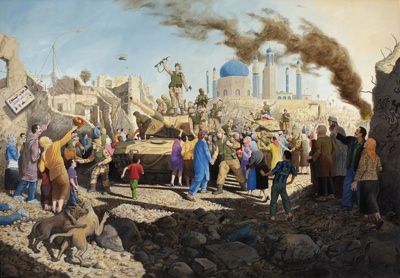The
Kevorkian Center at NYU (were I currently study) organized a wonderful literary symposium yesterday. In the morning,
Elias Khoury, Yitzhak Laor and
Yael Lerer spoke of “Representations of the Other in Literature,” particulary Israeli-Palestinian literature.
I have just recently read Ghassan Kanafani‘s novella “Return to Haifa,” which is generally considered to have the first humanized depiction of an Israeli character in Palestinian literature. Khoury also mentioned the work of the poet Mahmoud Darwish, in particular his poem “The Soldier Dreams of White Lilies.” In an article about Darwish, Adam Shatz writes that:
In “A Soldier Dreaming of White Lilies,” written just after the 1967 war, Mr. Darwish tells of an Israeli friend who decided to leave the country after returning home from the front.
I want a good heart Not the weight of a gun’s magazine.
I refuse to die
Turning my gun my love
On women and children.
The poem elicited ferociously polarized reactions, Mr. Darwish said: “The secretary general of the Israeli Communist Party said: `How come Darwish writes such a poem? Is he asking us to leave the country to become peace lovers?’ And Arabs said, `How dare you humanize the Israeli soldier.’ “
It’s also worth noting the character of Rita, an Israeli lover, who inhabits decades of Darwish’s poetry and was immortalized in the Marcel Khalife song with lyrics by Darwish “Rita and the Rifle.”
The first sympathetic Palestinian character in Israeli fiction on the other hand is widely considered to be the teenage Naim in A. B. Yehoshua‘s “The Lover,” written in 1977, although as panelists pointed out, even when depicterd sympathetically, few Palestinian characters in Israeli fiction are allowed to speak for themselves (in a previous Yehoshua short story, “Facing the Forests,” the Palestinian character is physically silenced: his tongue has been cut out).
Lerer, the head of the publishing house Andalus, spoke of their project to translate literature from Arabic to Hebrew, started in 2000 (she said that the number of works translated from Arabic to Hebrew is disproportionately small, both compared to translations from Western languages and to translations from Hebrew to Arabic). Unfortunately the project is currently stalled, due to generally dismal sales (a novel by the master Tayyib Saleh sold 150 copies).
According to the Israeli panelists, Israeli literature strives for a “high” literary tone and effaces both the inner heterogeneity of the Israeli experience (spoken language, Yiddish, dialects, the voices of Sephardic Jews) and links to Arabic culture and language. Laor spoke of the “fetishization of Western culture” and Lerer said that “the major Israeli policy today is building walls,” including in the field of culture.
In an afternoon panel (Sami Chetrit, Ella Shohat, Sinan Antoon and Ammiel Alcalay) this point came up again, with participants noting the difficulty of getting works by Arab Jews translated and published, because these works are not easily categorizable and challenge prevailing dichotomies.
In this panel, about “The writer as public intellectual,” the participants discussed not only the challenge for Middle Eastern writers and intellectuals of interjecting some nuance into thoroughly polarized debates, but also the growing ethnification of literature and academia, with ethnic/sectarian/racial categories expected to correspond to political positions or ideologies. Thus Sinan Antoon, an Iraqi Christian who left Iraq in 1991, has been approached and asked to write about “Iraqi Christian literature” (a category he is doubtful exists). When Ammiel Alcalay was trying to get a book about a Jewish convert to Islam in Iraq of the 1930s (by Shimon Ballas, an Iraqi Jew who emigrated to Israel in 1951) published, an editor told him: “This is an amazing book. But what does it have to do with Israel?”
I think the desire to fit Arab and Muslim and Jewish literature into identifiable categories goes beyond the “market niche” mentality of publishing and speaks to a view of the Middle East as one in which everyone can be categorized by religion/ethnicity/tribe and in which writers are often expected to inform us in some (often politically) useful way about their particular community. What I’ve often thought of as “the instrumental value” approach to, and what Antoon labelled the “forensic interest” in, Arab/Muslim literature drives me absolutely nuts and deserves a whole separate post.
In the meantime, for work that challenges such views, you may be interested in the recently published “Outcast” by Shimon Ballas, “I’jaam, an iraqi rhapsody” by Antoon, and “Scrapmetal” by Ammiel Alcalay. I picked up all three and can’t wait to read them. I would also keep my eyes out for the forthcoming English translation of Yitzhak Laor’s work. He read an excerpt and it was dark and hilarious.
